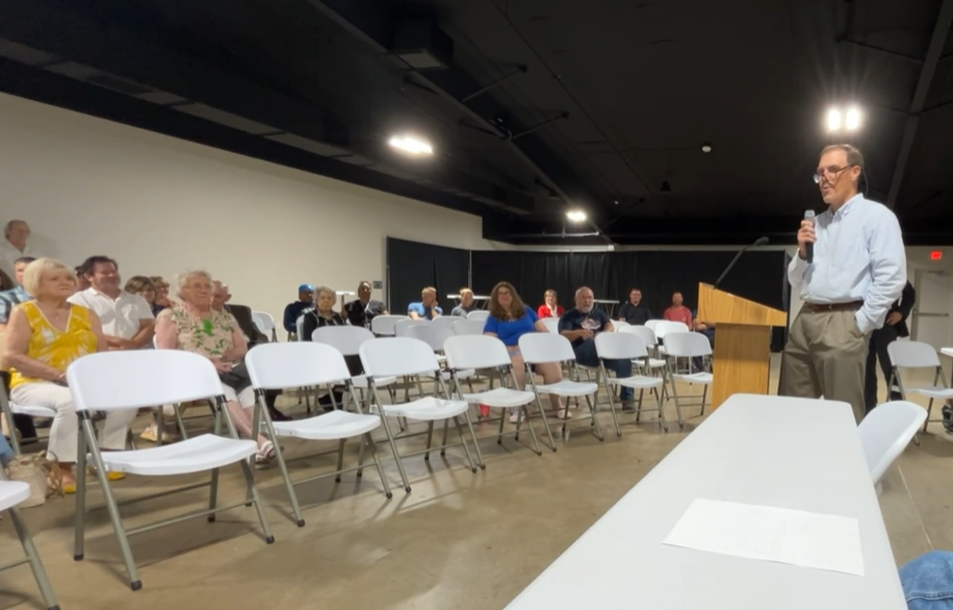Stanly commissioners ask local program to stop needle exchange program
Published 3:24 pm Monday, June 10, 2024

- Stanly County Commons
The topic of funding a peer program for a drug initiative which also hosts a needle exchange program was discussed at length at the latest meeting of the Stanly County Board of Commissioners.
Uwharrie Harm Reduction Initiative, based in Stanly, has conducted a needle exchange program funded by the Bloomberg Foundation. UHRI was asking the county for $79,055 in funds for its peer support program, a program the county had funded with opioid settlement funds for more than a year.
After a motion to pass the funding request with the state restrictions failed 5-2, a motion to approve the funding with the stipulation of the syringe service stopping June 30 passed unanimously.
Trending
At a meeting last month, commissioners approved multiple requests from local agencies for opioid funds, including Health and Human Services ($2,500), Bridge to Recovery ($50,000), EMS ($200,000), Nazareth ($73,586), Gateway of Hope ($63,600), SPARE ($86,277), Will’s Place ($60,000) and Daymark Recovery Services ($98,339). The Bridge to Recovery and Gateway of Hope votes were 6-1, with Commissioner Peter Asciutto voting against the motions.
The UHRI request was tabled in May over concerns which commissioners Patty Crump and Brandon King expressed about the needle exchange program. According to the May minutes, Crump said she would vote for the money for the peer program if the needle program was discontinued.
On June 3, County Manager Andy Lucas presented the item to commissioners to approve, with UHRI agreeing to certain stipulations. UHRI agreed to limit the number of syringes given to 20 per person per visit and 40 per person per week, encourage clients to return syringes and remove the current site of syringe distribution from 132 Church St. to a mobile unit.
Bob Harmon, executive director of Open Hands of North Carolina, a faith-based organization which UHRI is under, spoke said “we would like to see if that would be a compromise with county commissioners for what we’ve done.”
When asked by Asciutto about the number of homeless clients UHRI has, Harmon said it was about 19 out of the 119 individuals which have received syringes in the last six months. Harmon later said about five or six clients who receive syringes have diabetes.
Harmon said, referring to the suggestion of discontinuing the syringe program, “if I’ve got to push this aside, I will keep them to do it. I don’t know how it’s going to affect the numbers coming in.” He said he did not know how discontinuing the program would “probably not affect the number of syringes on the street very much with us not doing, because they will still be out there.”
Trending
When asked by Chairman Bill Lawhon about the percent of syringes UHRI gets back, Harmon said the group’s rate of 63% is among the highest in the state.
Harmon said the group averaged between 17 and 20 persons on Tuesday and Friday, the two days the exchange took place. He said UHRI would cease the needle program, “not because we want to, but we know how important it is to have these peer support personnel working (with clients) to try to get them sober.”
Commissioner Trent Hatley asked if another needle exchange program may come into Stanly when UHRI stops its program. Harmon said “percentage wise, I’d say it’s very high.”
Gay Smith, who works for UHRI, said the vast majority of their clients have homes, jobs and children, adding they are there “because they need pain management. They can’t get what they need from their doctors any longer, but they have intense pain.”
She said many clients are elderly and need drugs to function. She said any needles found on the street mostly come from mentally ill patients who are not as compliant about correctly disposing of or exchanging their syringes.
“If we do have to give up giving out the syringes, your disease and other things are going to cost the county more,” Smith said.
Smith said many clients are using fentanyl, as well as a new drug, xylazine, which does not respond to the Narcan overdoes treatment medication.
Scott Efird said he did not like the syringe program, but noted it was “a carrot” to bring people in for the peer counseling. Efird made the motion to approve the funding with the needle limitations, seconded by Peter Asciutto.
Wendy Growcock, a health educator working in the county’s health department, said needle exchange programs have to register with the state, and normally common courtesy keeps programs from going into other areas where a program already exists.
During discussion of the motion, King said he would never agree with using taxpayer dollars to fund even the mobile unit idea.
Chairman Bill Lawhon said he was against the program, saying his conviction is, “by supplying needles, and I don’t care if it’s a law or not, if we’re supplying syringes…we’re enabling drug addicts to continue to use.”
Growcock said health concerns which the program addresses include blood borne pathogens, like hepatitis C, HIV, syphilis, endocarditis and others.
Smith said she “had been through the same struggle with the needles and how difficult a decision it is to pass those needles.” She added the program was beneficial “when you weigh not only the health of the individuals but also the money that it saves the county and the overdoses you had before.”
Lawhon asked Smith how many clients UHRI had gotten to rehab in the last year. Smith said 60 to 70.
The motion failed, 4-3, with Asciutto, Hatley and Efird voting for the motion.
Crump then made a motion to approve the funding with the contingency that the syringe program ends June 30, seconded by King. The motion passed unanimously.
After the board’s decision, Smith said UHRI would continue to give a kit to clients with an alcohol swab, a cooker that uses sterile water with the drug, band-aids and triple antibiotic ointment and condoms.
“We give them anything that they need to have a safe experience,” Smith said. “As long as we can still give these things out, that’s good…(it) kind of helps a little bit with safety.”
David Talbert, who founded Open Hands in 2013, said he looks “forward to the day when we can understand that substance abuse disorder is not a moral failure. It’s a public health epidemic.”







